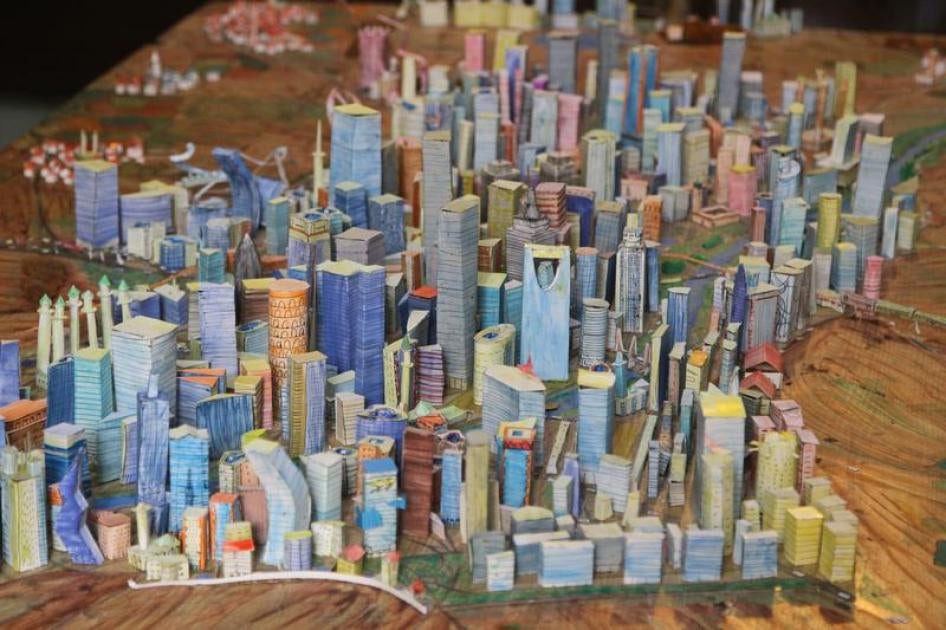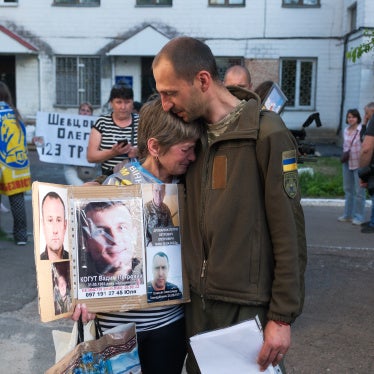- What is Law No. 10 of 2018?
- How do property owners make a claim?
- What barriers would keep owners from being able to claim their property? Is Law No. 10 of 2018 discriminatory?
- Is this the first time the government has used urban planning laws to seize property or displace residents?
- Is Law No. 10 of 2018 lawful?
- Will Law No. 10 affect the ability of displaced residents to return?
- What should be done?
The Syrian government is poised to confiscate and redevelop residents’ property without due process or compensation under a new property law, Law No. 10 of 2018. The law, which the government is promoting as an urban planning measure, will create a major obstacle to returning home for displaced residents.
1. What is Law No. 10 of 2018?
Law No. 10 of 2018, passed by the Syrian government on April 2, 2018, allows for creating redevelopment zones across Syria that will be designated for reconstruction.
The law does not set out any criteria for which areas can be designated as redevelopment zones or a timeline. Instead, redevelopment zones are to be designated by decree. Within one week after a decree is issued, local authorities are to request a list of property owners from the area’s public real estate authorities. Public real estate authorities must provide the lists within 45 days.
If their property does not appear on the list, people who own property in the zone are to be notified and have 30 days to provide proof of ownership. If they fail to do so, they will not be compensated, and ownership reverts to the province, town, or city where the property is located. Those who succeed in proving property ownership will get shares in the zone.
They can: 1) register the sector in their names and receive a share of the profits from re-development; or 2) sell their shares in a public auction; or 3) create a company to invest in and develop the division. All the shareholders in a sector must agree to one option. Shareholders who want to form a company or invest in reconstructing the division must not fall foul of any Syrian law.
Under the law, everyone residing in these zones must move out. Local authorities will provide compensation equivalent to two years’ rent to tenants who do not qualify for alternative housing. Tenants who have a right to alternative housing will be placed in that housing within four years, and in the interim will also have their annual rent paid. It is not clear from the law who will qualify for alternative housing or how this determination will be made.
2. How do property owners make a claim?
Property owners have 30 days to submit documents proving ownership to local authorities. If the required documentation is unavailable, residents or owners can make a case within the 30-day period to the local authorities using other evidence. They must provide the property location, boundaries, and information about the shares they own, and the real estate category the property comes under (commercial or residential), as well as information about any lawsuits they have brought or outstanding suits against them.
If the owner is unable to personally make a claim, certain relatives or a designated agent can come forward in their place. Relatives must show that owners cannot personally make the claim. In addition, legally recognized agents must both be appointed by the property owners and require clearance by a government security services, and relatives must prove their relationship to the owner.
If an owner fails to make a claim within the 30-day period or the claim fails, the property reverts to the province, town, or city of the redevelopment zone and the owner is not compensated. There is no right to appeal.
3. What barriers would keep owners from being able to claim their property? Is Law No. 10 of 2018 discriminatory?
The procedural requirements in the law coupled with the political context in which it operates create significant potential for abuse and discriminatory treatment of displaced residents and residents from areas previously held by anti-government groups. In addition, several of the Syrian local land registries have been destroyed during the conflict, and only 50 percent of Syrian land was officially registered even before the war.
Displaced residents, particularly those from areas considered to be anti-government, will be more vulnerable to property seizure under Law No. 10. According to the United Nations Refugee Agency, over 11 million Syrians have been displaced either internally or to host countries since the start of the Syrian conflict. Many will not be able to return to their properties to make a claim themselves, and the 30-day window for sending a relative or an agent will be insurmountable for many. Further, 70 percent of refugees lack basic identification documentation, according to the Norwegian Refugee Council. This documentation is needed in order to make a property claim and to appoint a legally recognized agent.
As of July 2017, a third of housing in Syria had been destroyed. The law does not provide for compensation or any other remedy for people whose property has been destroyed.
It will also be impossible for the thousands of people forcibly disappeared during the conflict to claim their property. These individuals will not be able to personally make a claim or to appoint a legally recognized agent. Their relatives will in many cases also not be able to show why the owners cannot personally make the claim. In addition, relatives of those killed in detention may not have the necessary documentation to prove the person’s death, and since the property is still owned by the missing relative, they will also not be able to make a claim.
The requirement for security clearance for a local agent will also be a barrier. Residents of areas previously held by anti-government groups are unlikely to want to apply for or be able to get security clearance. Human Rights Watch had previously documented the security services’ highly abusive treatment of individuals suspected of affiliation with anti-government groups, including arbitrary detention, torture, and extrajudicial executions.
4. Is this the first time the government has used urban planning laws to seize property or displace residents?
No. Syrian authorities have previously used urban planning to conduct large-scale demolitions and evacuations of buildings and to seize property and displace residents.
In Damascus and Hama, between July 2012 and November 2013, Human Rights Watch documented seven large-scale demolitions and evacuations by the government under the guise of urban planning. These demolitions and evacuations violated the laws of war, as they served no necessary military purpose and appeared intended to punish the civilian population, or because they caused disproportionate harm to civilians.
The Syrian government also has used Decree 66 of 2012 to seize property and displace residents. The decree’s official purpose is to “redevelop areas of unauthorized housing and informal settlements [slums]” in two zones in Damascus governorate. Analysts and journalists have reported the decree has been used to target and expel residents of anti-government held areas and destroy these properties, without due process, compensation, or alternative housing.
Legislative decree No. 63 of 2012 empowered the Finance Ministry to seize the assets and property of people who fall under the Counterterrorism Law of 2012 and transfer their ownership to the Syrian government. The Counterterrorism Law of 2012 provides a dangerously broad interpretation of what constitutes terrorism, and unfairly criminalizes a large segment of the population without any due process rights or fair trial.
Human Rights Watch spoke to two people whose property had been confiscated under this decree. They said they had not been provided with any notice and had not received a chance to appear in court or challenge the decision. When the relative of one of them approached the authorities to reclaim the confiscated property, the security services responsible for the area told him to give it up or face prosecution.
5. Is Law No. 10 of 2018 lawful?
No. Issam Kawli, the director of real estate affairs in the Ministry of Local Administration, has said that Law No. 10 is an urban planning law and does not affect property rights except when there is a need to build infrastructure that makes a positive contribution to the public. But in effect the law does affect property rights without due process or compensation, amounting to forced eviction and property seizure for owners whose property rights are not recognized.
Under international law, residents’ right to adequate housing is protected. The treaty body tasked with interpreting the International Covenant on Economic, Social and Cultural Rights (ICESCR), has found that this must include guarantees of legal protection from forced eviction. In particular, it outlines due process procedures that are essential but are not covered by Law No. 10, including (a) an opportunity for genuine consultation with those affected; (b) adequate and reasonable notice for every one affected before the scheduled eviction date; and (g) provision of legal remedies; among others.
The law’s 30-day period, as well as a right to appeal under Law 10 that does not halt the eviction until the appeal is decided does not comply with these requirements. The apparent lack of access and capacity for refugees affiliated with anti-government groups to lay their claims means that there is no opportunity for genuine consultation.
The Universal Declaration of Human Rights and the Arab Charter on Human Rights guarantee the right to property. The Arab Charter states that no one should ‘under any circumstances be arbitrarily or unlawfully divested of all or any part of their property. International courts have found the right to property and possessions protects traditional but undocumented property rights over homes and land, as well as rights documented by formal land title and registration.
The Pinheiro Principles, widely agreed-upon principles that govern property rights of refugees and internally displaced people, encompass a number of additional protections that apply in this situation. In addition to the right to adequate housing, the principles protect refugees and displaced people from discrimination and require that legislation covering housing, land, and restitution is neither de facto or de jure discriminatory and is transparent and consistent. If a refugee or displaced person is unlawfully or arbitrarily denied their property, they are entitled to submit a claim for restitution from an independent and impartial body.
6. Will Law No. 10 affect the ability of displaced residents to return?
Yes. Law No. 10 also creates a significant obstacle to return. A significant segment of a surveyed refugee population have said they are unlikely to return without a house or property to return to, according to Carnegie Endowment of Peace.
Some residents whose property was confiscated under Decree 63 or 66, for example, told Human Rights Watch that they were unlikely to return as a result. In those cases, the confiscation of property was not limited to residential property but also commercial property such as a pharmacy, which diminished the residents’ livelihood prospects.
In cases in which the property was confiscated due to perceived political affiliations, under Decree 63 and the Counterterrorism Law, it provided a strong signal to people Human Rights Watch interviewed that they were not welcome to return. They expected that they would face a significant risk of persecution, arbitrary arrest, or mistreatment by the security services operating in the area.
7. What should be done?
Allies of the Syrian government, such as Russia and Iran, should encourage the government to repeal problematic laws that act as obstacles to return, including Law No. 10, Decree 66, and the Counterterrorism Law of 2012.
The law also provides a formal framework for ownership of the land to revert to the Syrian government, which is empowered to award reconstruction and development contracts to corporations or investors and pay them with shares in the zone.
Donor countries, investors, and humanitarian agencies operating in areas retaken by the government should ensure that any funds they provide to programs aimed at rebuilding and rehabilitating structures in areas retaken by the government meet certain standards. They should make certain that their funds do not contribute to the abuse of property rights of residents or displaced persons, and that the funds to not go to entities or actors responsible for human rights violations and violations of international humanitarian law.







